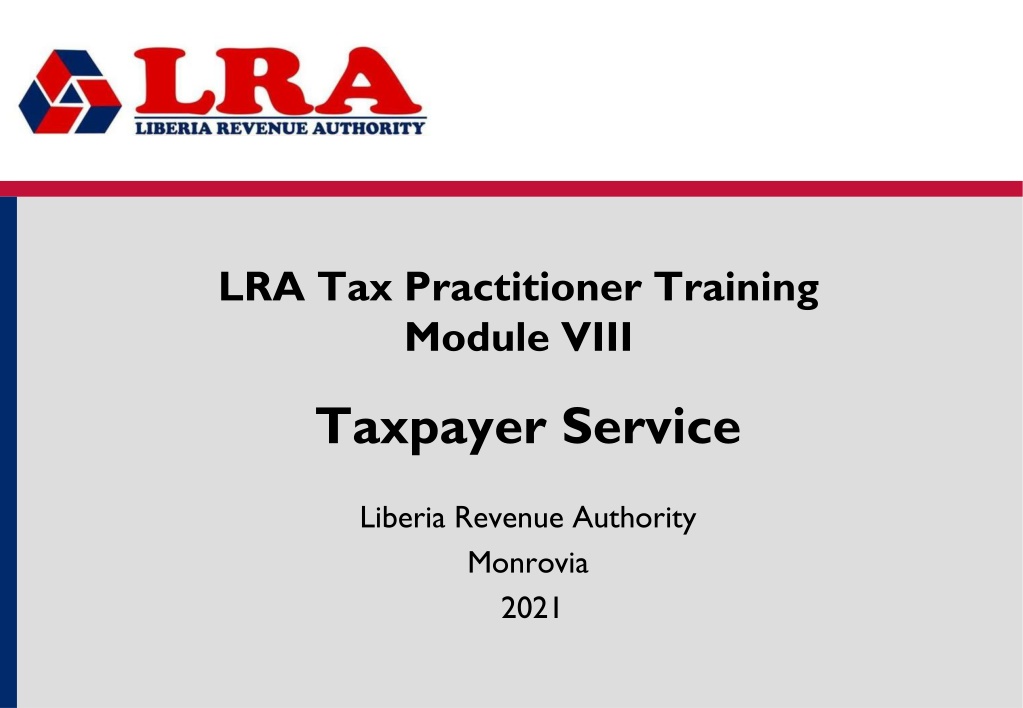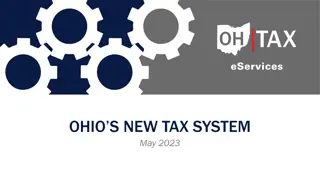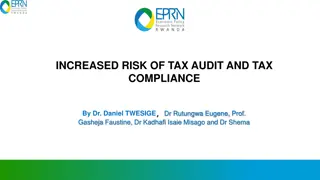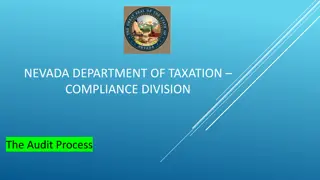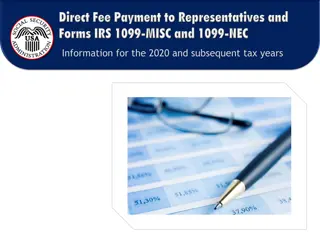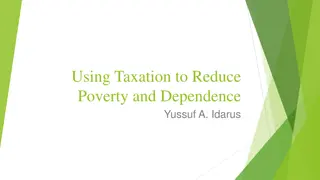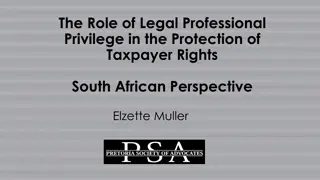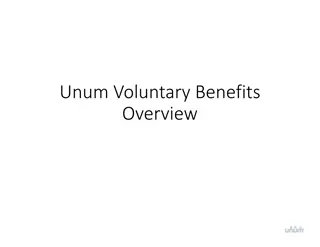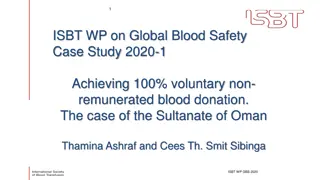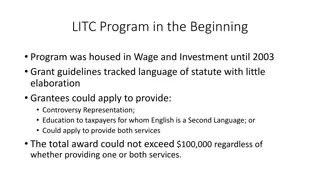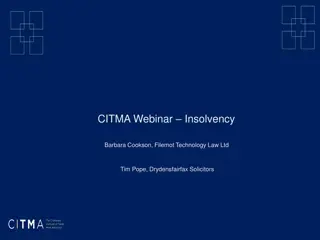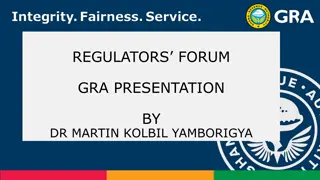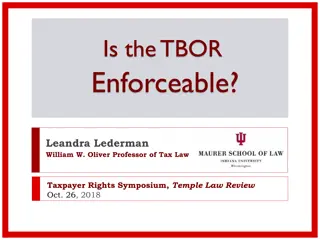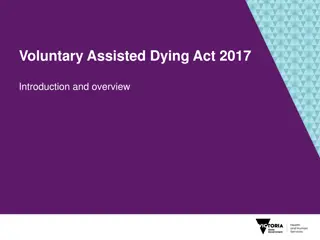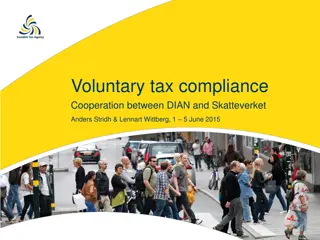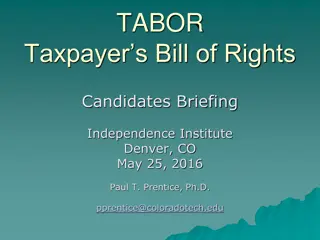Enhancing Taxpayer Education for Voluntary Compliance
Liberian taxes operate on a self-assessment system, where taxpayers must assess, submit returns, and pay taxes. Taxpayer education is crucial in promoting voluntary compliance. The Liberia Revenue Authority's Taxpayer Service Division conducts extensive educational programs covering tax types, responsibilities, and communication methods. The program focuses on tax introduction, legislation, rights, and responsibilities to ensure taxpayers understand and fulfill their obligations.
- Taxpayer education
- Voluntary compliance
- Liberia Revenue Authority
- Tax legislation
- Tax responsibilities
Download Presentation

Please find below an Image/Link to download the presentation.
The content on the website is provided AS IS for your information and personal use only. It may not be sold, licensed, or shared on other websites without obtaining consent from the author. Download presentation by click this link. If you encounter any issues during the download, it is possible that the publisher has removed the file from their server.
E N D
Presentation Transcript
LRA Tax Practitioner Training Module VIII Taxpayer Service Liberia Revenue Authority Monrovia 2021
CONTENTS 1. Taxpayer Education (Slides 4-11) 2. Taxpayer Assistance (Slides 12-15) 3. Registration/Taxpayer Identification Number (Slides 16-21) 5. Voluntary Tax Compliance (Slides 24-27) 2
1.1 Taxpayer Education: Background Liberian taxes are based on the principle of self-assessment system, where taxpayers are required to assess their tax, submit their tax returns and pay up their tax liability. The success of such a self-assessment based system depends on the level of voluntary compliance of the taxpayers. That is why one of the most important functions of a modern tax administration is to raise the level of voluntary tax compliance. Taxpayer service function plays an important role in raising the level of voluntary compliance amongst the taxpayers by educating the public, providing timely information and most important, providing quality customer service to the community. By providing timely and accurate customer service, the LRA ensures that taxpayers understand and execute their fiscal responsibilities and therefore help the Country and its government meet the commitments to all citizens. 3
1.2. Taxpayer Education: Taxpayer education program Taxpayer education is an important function of the taxpayer services division. To educate taxpayers, the Taxpayer Service Division launched an extensive taxpayer education program containing such matters as: Subject matter tax types, tax functions and right and responsibilities of the taxpayers Methods of education in person education through taxpayers service centres, information sessions, TV/radio programs, brochures, news paper articles, advertisements and correspondence Means of communication face-to-face contacts, telephone calls, SMS, emails, radio, TV, website, social media Time of education Regularly, specially when new law was adopted or amendments to the existing law were introduced, new procedures and forms implemented and around filing and payment deadlines. 4
1.3 Taxpayer Education: Subject matter of taxpayer education LRA Taxpayer education program focuses on: Introduction to and rationale of taxation Introduction of various taxes: personal income tax, corporate income tax, goods and services tax, excise, customs, real estate tax Structure of various taxes: Tax base, exemptions, rates Operation of various taxes: registration, filing, payment, refund, audit, enforcement Tax legislation: Act, Regulations, Procedures and Forms Changes to tax legislation Taxpayers rights and responsibilities 5
1.4 Taxpayer Education: Development of taxpayer education materials Taxpayer education materials are developed on all aspects of taxation and tax administration related to the taxpayers. As the need of large, medium and small taxpayers are different, tax education materials are targeted to the taxpayer segments. Similarly, information are tailored to the needs of key economic sectors, intermediaries (tax advisors), and disadvantaged groups (groups with literacy or language difficulties). Taxpayer Service Division records subjects of queries for report to LRA regarding the need for additional education materials. It is necessary to analyze taxpayers needs, identifying taxpayer issues, and develop materials that meet taxpayers requirements. 6
1.5 Taxpayer Education: Means of taxpayer education Potential means of a taxpayer education program include: telephone calls, SMS correspondences tax brochures, pamphlets, posters, cartoon information seminars, tax interaction programs, dialogue sessions television and radio programs dramas, videos publication of newspaper articles and advertisements websites social media, tax education visits 7
1.6 Taxpayer Education: Taxpayer service channel strategy An appropriate and effective communication channels strategy are developed to reach out the taxpayers and any specific or a combination of several following channels are adopted to educate taxpayers on specific issues: face-to-face contacts (e.g. taxpayer advice centres; seminars with sector representatives) paper (targeted reminders, brochures, correspondence) telephone calls SMS radio and TV a website (in many countries the most important channel) social media Email 8
1.7 Taxpayer Education: Time to conduct taxpayer education Taxpayers education is not an one time activity, it is conducted regularly. Tax laws, regulations, procedures, and forms change frequently which bring changes in the compliance requirements of the taxpayers and the need to educate taxpayers. New businesses emerge and new taxpayers come into the tax net almost every day of any tax administration, who should be educated about their rights and responsibilities. Similarly, existing taxpayers need to be reminded about the filing and payment deadlines. 9
1.8 Taxpayer Education: Taxpayer education visits Tax education visits are important means of tax education program particularly in case of a newly registered taxpayer. A newly registered taxpayer may be visited within few days of registration, at least before his first tax return is due to see whether he has been able to comply with the tax requirements, including invoicing, recording, charging, filing and payment. Tax officer should take this opportunity to educate taxpayers fully so that he does not commit mistakes in the future. Similarly, tax officials should also educate taxpayers about tax structure, and operation and taxpayers rights and obligations during audit and enforcement visits. 10
2.1Taxpayer Assistance: General requirements Taxpayer assistance is another important task of the Taxpayer Service Division. It should make every effort to assist taxpayers to resolve their specific tax issues in order to meet their tax obligations in a proper and timely manner. Particularly, tax officers should assist taxpayers to determine their tax obligations, including filing accurate, complete, and timely returns and paying correct amount of tax. At this stage of Liberia, many taxpayers will need assistance from tax officials to file returns and pay taxes on time and accurately. Tax officers should always strive to identify the taxpayers needs and finding a way to provide this assistance. 11
2.2 Taxpayer Assistance: Assistance to Walk-in Taxpayers Taxpayer Service Division employees are the first contact point of taxpayers and should assist taxpayers in meeting their obligations, including the followings: Greet walk-in taxpayers, Determine the needs of taxpayers, Provide question/answer service in a complete, concise, and accurate manner, If necessary, direct taxpayers to the appropriate functional unit, Receive all types of documents from the taxpayers, Submit received documents to the respective section, Distribute registration, declaration and other forms, brochures, pamphlets, instructions, booklets and other tax education materials to taxpayers, 12
2.3 Taxpayer Assistance: Assistance through correspondences and telephone Reply to written correspondence from the taxpayers in a complete, concise, and accurate way within a reasonable timeframe. (refer complex questions to the appropriate section). Provide complete, concise, and accurate response to telephone enquirers (refer complex questions to the appropriate section). Remember, an informed taxpayer is a valuable asset to the tax administration and the Country. So provide complete, concise, and accurate information in a timely manner as follows: Attending to a phone call in at most 30 seconds. Attending to a taxpayer visiting a tax office in at most 30 minutes. Acknowledging receipt of letters in at most 7 days. 13
2.4 Taxpayer Assistance: Call center operations It is common to operate a Call Center under the modern tax administration to provide each and every type of information through a knowledge base system. Knowledge base software can be developed for all types of possible questions, their answers and all types of formats relating to tax compliance and covering all legal matters. It is important to provide toll free telephone services in order to respond to requests of the taxpayers. The establishment of the call center makes it possible to provide required information to taxpayers through phone, thereby avoiding the need for physical contact between the taxpayer and tax officials. Minimization in direct contact between tax officials and taxpayers would reduce the scope for collusion and corruption.
4.1 Taxpayers Rights and Responsibilities: Taxpayers rights Right to receive tax related information as per the prevailing laws; Right to ask for an advance ruling from the tax administration; Right to receive a written report on proposed assessments that includes specific reasons and the applicable law; Right to appeal any assessment; Right to fair and impartial administration of the tax laws; Right to secrecy in respect of tax matters which is inviolable; Right to receive courteous and considerate treatment from all employees of tax administration; Right to receive a prompt refund with interest once a determination of overpayment has been established; Right to represent yourself, have someone else accompany you or, with proper written authorization, have someone represent you in your absence during the examination of your return, receive copies of statements made or recorded etc.; and Right to receive respectful behavior.
4.2 Taxpayers Rights and Responsibilities: Taxpayers responsibilities Register under the tax as per the law; Issue invoices; Keep all necessary information, including books and records, maintain accounts and preserve them for a period required under the tax laws; Correctly determine the payable tax, prepare and submit returns and pay the tax within the specified time; Deduct or withhold the correct amounts of tax from payments and deposit it to the treasury as per the law; Disclose to the tax officials in a timely and useful manner all information when required by the tax law; Cooperate with the tax officials in a way that assists the exercise of their power under the law; and Comply with all other obligations imposed by the tax laws.
5.1 Voluntary Tax Compliance: Promotional and Regulatory Measures The level of voluntary compliance amongst the taxpayers could be raised through a set of promotional and regulatory measures, including: Rationalization of the tax structure, Simplification of tax procedures and forms, Simplified recordkeeping for small taxpayers, Tax declarations that are partly pre-filled, E-filing. Withholding taxes that are final (no deduction of costs possible), Regular reviews of the design of forms, to remove superfluous questions, Publication of tax rulings and tax objection decisions, Collection and publication of Frequent Asked Questions (FAQs), E-payment, Conducting a comprehensive taxpayer education program, Engendering a positive and service minded attitude in tax personnel, Strengthening the tax administration, and
Tax Compliance Strategy . . Apply the full force of the law: taxpayer audits, rationalizing the penalties, enforcing arrears collections etc. Decided not to comply Deter by detection: tax intelligence, risk- indicators, revenue region profile, and customs value database, improve taxpayer registry, taxpayer naming and shaming/ transparency, etc. Don t want to comply but will if we pay attention Would like to comply but don t know how Assist to comply: taxpayer education: call center, advance tax rulings, frequently asked questions Q&As, paying taxes guides, education visits etc. Make it easy to comply: measuring cost of compliance, e-filing, mobile money, reduce filing frequently, tax appeals, payment in installments, reduce number of unnecessary audits. Compliant Taxpayers
5.2 Voluntary Tax Compliance: Tax compliance strategy Most of the taxpayers at the bottom line want to pay tax, but need a simplified system. Second grade taxpayers want to comply but may not always succeed. Tax officials should assist them to comply by way of tax education and taxpayer assistant. These are the great majority of taxpayers in any country, and they are the people you are serving. Some taxpayers, for whatever reason, do not want to comply. These taxpayers, no matter how easy you make it, will not pay their taxes, or file their declarations unless they are forced to. Some immediate action for compliance is necessary. Taxpayer Service Division will inform potential taxpayers that they must register, send reminders to non-filers and ask non-payers to pay up. Financially tough measures are needed for a small group of taxpayers that have decided not to comply so that the bottom line
5.3 Voluntary Tax Compliance: Obtaining taxpayer feedback on products and services A normal tool would be: a taxpayer satisfaction survey, with questions about specific areas of service, like e-filing, payment facilities, call centre (waiting times), usefulness and user- friendliness of specific guides, brochures and other resources, and other services. It should be a tool for future service enhancement, like improving search tools, simplifying publications and forms, providing more clear, more complete, more up-to-date information, reducing waiting times, and making the website easier to use. Ask for overall rating of LRA services first; allow for open text feedback; optimise it for mobile telephone; identify the taxpayer segment (location, size) of the respondent. 20
END OF MODULE 8 ON TAXPAYER EDUCATION Thank You!
